
Bobby Davro was born on September 13, 1959 in Middlesex, England as Robert Nankeville. He is an actor and writer, known for EastEnders (1985), Copy Cats (1985) and Winner Takes All (1978).

Brittish Actors

Bobby Davro was born on September 13, 1959 in Middlesex, England as Robert Nankeville. He is an actor and writer, known for EastEnders (1985), Copy Cats (1985) and Winner Takes All (1978).
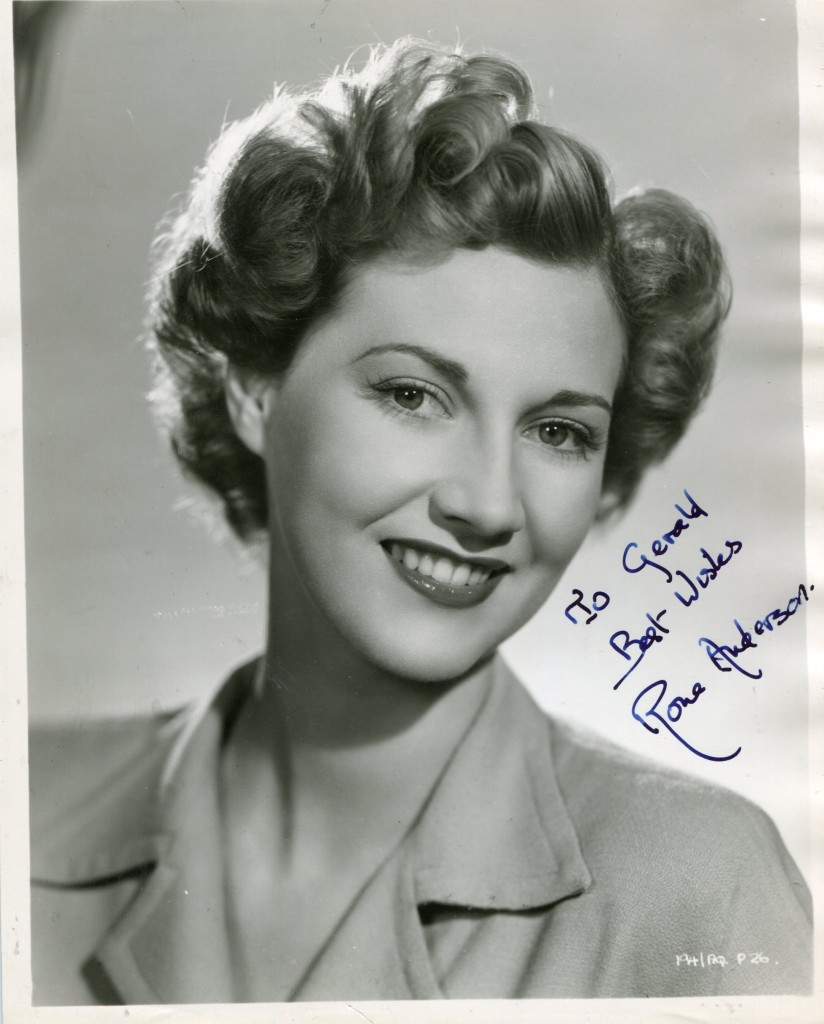
Rona Anderson was a staple of British B movies of the 1950’s. She was long ,arried to Gordon Jackson. She died in 2013.
Her Guardian obituary by Ronald Bergan:
In the 1950s, while watching a second feature before the “big picture” at their local cinema, regular British filmgoers would often have seen Rona Anderson, who has died aged 86. Anderson starred in 20 movies between 1950 and 1958, mostly well-crafted, low-budget thrillers. Opposite such luminaries as Robert Beatty, Jimmy Hanley, John Bentley, Paul Carpenter and Lee Patterson, Anderson was the classy girlfriend who helps the hero solve a murder, usually via a visit to the criminal underground, all within the hour allotted to the film.
According to the Scottish comedian Stanley Baxter, Anderson “had this incredible, porcelain-like face, too beautiful for film … The camera likes angularity, to see the edges, and I think Rona’s face was just too perfect.” Whatever the reason, Anderson made few major movies, though she appeared in many popular television series, such as The Human Jungle (1964), Dr Finlay’s Casebook (1965), Dixon of Dock Green (1966-71) and Bachelor Father (1970-71), and on stage throughout her career. She was also busy in the 1960s, bringing up her two sons with the actor Gordon Jackson, to whom she was married from 1951 until his death in 1990.
For the actor Kenneth Williams, a friend for more than 30 years, the Jacksons were a surrogate family. In an entry in his diary for 8 July 1957, Williams notes: “Gordon & Rona at 7.30 which was as delightful as ever. A sweet most delectable pair whom I enjoy enormously.” Seven years later, the more usually waspish Williams writes: “Went up to see Gordon & Rona. They gave me lunch and I stayed till about five. I had a lovely time. The boys were marvellous. They’re a lovely family.”
Unlike Jackson, for so long the token Scotsman in British war films and action movies, who later found wide fame as the butler Mr Hudson in Upstairs, Downstairs, Anderson had a “posh” English accent – obligatory for British leading actors in the 50s – although she was born, raised and educated in Scotland, with a short time as an evacuee in Ottawa, Canada, during the second world war.
Anderson, born in Edinburgh, started acting at an early age, training at the Glover Turner Robertson School in her home town. From 1945 until 1949, she was a member of the Citizens’ theatre, Glasgow. Her first film role was as one of the passengers in the spy thriller Sleeping Car to Trieste (1948). Her second was opposite her future husband in Floodtide (1949), a romantic drama set and shot mainly on Clydeside.
In the episodic Poet’s Pub (1949), Anderson was Joanna, the daughter of obnoxious Professor Benbow (James Robertson Justice), the nemesis of her poet boyfriend, Saturday Keith (Derek Bond). One of her rare A-pictures was Scrooge (1951), with Alastair Sim in the title role. In a tender scene with George Cole as Scrooge’s earlier self, Anderson plays his one true love, telling him that they must part forever because “another idol has replaced me in your heart. A golden idol.”
In the cold war “quota quickie” spy drama Little Red Monkey (1955), Anderson got the chance to play opposite the Hollywood tough guy Richard Conte. After two tepid pictures in the 1960s – The Bay of St Michel (1963), about the search for Nazi loot, and Devils of Darkness (1965), in which Anderson tangles with vampires in Brittany – she had the role of Miss Lockhart, the chemistry teacher, in The Prime of Miss Jean Brodie (1969), a rival of Maggie Smith’s Miss Brodie for the attention of the music teacher, Mr Lowther, played by Jackson.
From time to time through her career, Anderson returned to the stage. At the 1960 Edinburgh festival, she appeared in the Scottish poet Sydney Goodsir Smith’s epic historical play The Wallace; she was in the first stage production of Brian Clark’s Whose Life Is It Anyway? at the Mermaid theatre, London, in 1978, in a cast headed by Tom Conti and Jane Asher; and in 1981, she played the mother of Diana, princess of Wales in the Ray Cooney comedy Her Royal Highness …? at the Palace theatre, London, with Marc Sinden as Prince Charles.
Anderson is survived by her two sons, Roddy and Graham.
• Rona Anderson, actor, born 3 August 1926; died 23 July 2013
Her Guardian obituary can be accessed on-line here.
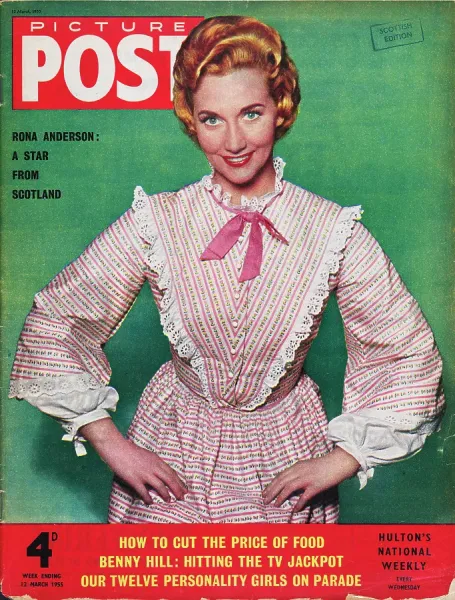
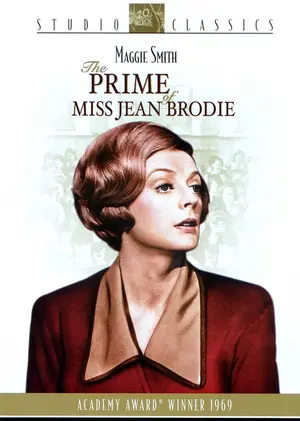


“Mirror” article on Tony Hadley from 2013:
The singer says that at the height of his fame the only way he could trust himself to stay faithful to his first wife Leonie was to go on bender
Eighties heartthrob Tony Hadley had so many offers from besotted fans he would drink himself into oblivion to resist the temptation of sleeping with them.
The Spandau Ballet singer says that at the height of his fame the only way he could trust himself to stay faithful to his first wife Leonie was to go on benders.
“There were always so many beautiful women throwing themselves at us,” he says. “One time we had 40 models in our hotel suite – someone had called an agency and invited them along.
“We were mobbed everywhere we went and it was tough to resist all that temptation, so the best thing to do was get so p***** I couldn’t have done anything anyway.”
He tells how at the time he had a young family and wanted to “uphold certain standards”.
Tony’s marriage to Leonie, mum of his three oldest children, eventually broke up – but he says he never strayed during the band’s heyday.
Now happily married to PR girl Alison Evers, the 53-year-old pop legend has two more children, Zara, six, and Genevieve, 17 months.
Despite having been in the business for 30 years now, he reveals how he is still faced with endless temptation.
“Charity ladies days are wild,” he says, laughing. “Me and Davina McCall both support Action Medical Research and during events we’re on the top table.
“It’s like a wedding except all the other tables are full of 250 housewives who like to lunch.
“They start off very demurely and they’re all dressed to the nines. But then all of a sudden the wine starts flowing and the volume levels become unbelievable. They’ve been known to raid the stage when I start singing.
“No one’s ever actually given me their keys, but I have had women say, ‘How about it?’ It’s definitely not my idea of fun.”
But while Tony has never enjoyed that aspect of rock ’n’ roll life, he does admit he wasn’t a total saint.
“I went over the edge when I was in the band,” he says. “I did a lot of crazy things when I’d been drinking. One time, in a hotel, I tried to jump off one balcony to another balcony and the guys had to catch me as I was about to leap off. I’d have died if I’d jumped.
“Another time I jumped, drunk of course, on to a moving sports car and rolled across the bonnet and dented it.
“I’m lucky the guy didn’t shoot me.”
He says he did manage to resist drugs though, adding: “I’ve been offered them loads of times but I’ve never touched them. I’m fascinated by what makes people want to take drugs.
“When you see someone snorting a line off a toilet seat, it’s gross. And I don’t get how you can tie a band around your arm and inject yourself.”
With fellow bandmates Gary and Martin Kemp, Steve Norman and John Keeble, Tony had 23 hit singles, including True, Gold and Through The Barricades. Spandau Ballet sold 20 million albums worldwide.
But the band split acrimoniously in 1990 and a huge battle over songwriting royalties ended up in the High Court in 1999. Tony and the Kemp brothers didn’t speak to each other for a decade. The band eventually reunited in 2009.
“Twenty years of harbouring grudges, and 10 of not even talking was weird,” says Tony. “Looking back I wish we’d never let it get to that stage. We were just 16 when we got together, and as you get older you become less confrontational. If I had my time again, I’d have handled things differently.”
The first time round for the band, Tony would get bras and knickers thrown at him. Now he says it’s red roses and, bizarrely, cookies.
“I said once I liked chocolate chip cookies and now I get full packets of them thrown at me on stage,” he reveals. “I wish I’d said it was Cartier watches.
“Fans used to write love letters to me, but I haven’t had any marriage proposals.”
That’s just as well or Ali might have had something to say about it.
“She keeps me in line,” he laughs. “And having children at my age keeps me young. Zara is bouncing off the walls and full of energy, and Genevieve is on the go from the minute she wakes up.
“When I met Ali I was torn about whether I wanted more kids or not, but then you fall in love and it happens and it’s great. Having five children is like, ‘Wow’.”
Being a dad to young kids at his age puts him in the perfect position to comment on Simon Cowell’s impending fatherhood. “Simon is a great guy and will be a fantastic dad,” he says. “He’s the same age as me, and he’ll have plenty of energy.
“I’ve met Simon a few times through the charity work he does, and he’s great with kids. Zara loves him.
“He has a fantastic rapport with children.
“People say 53 is too old to be a dad, but I don’t think so. It’s the input you have that counts, and you’re more experienced and worldly-wise.”
With plans to release a new solo album in the autumn and tour dates lined up for October, Tony still finds time to be a hands-on dad.
He admits things were different when his older kids – Tom, 29, Toni, 26, and Mackenzie, 22 – were little.
“I’m around a lot more now because I’ve stopped doing the block tours I did with Spandau,” he says.
“Although when the album comes out I’m going to be promoting that and I’ll be in Australia and New Zealand.
“But generally I have a lot more quality home time as I’m not going off for months and months. I want to appreciate every moment with the kids now as they’re only young for a finite amount of time.”
Tony’s fans these days aren’t the hysterical teens they once were. “The majority of my fans are 30-plus,” he says. “But I have some who are in their late 60s.
“On the other side, I also get kids who are 17 or 18 who are into the whole 80s thing and like tracks like Gold.
“The reaction was incredible after it was played at the Olympics last year, but even I was sick to death of it in the end.” Tony has made no secret of the fact that he’s a big fan himself of One Direction. “They should take advantage of the money, fame and girls, and fill their boots,” he says.
While he admits that watching Harry Styles and co makes him nostalgic, he says he is happier now than he was back in the early days of his career.
“Life has come good for me,” he says. “I have a beautiful family and a great career, and I’m actually earning more now than I was in the 80s.
“When I’m asked, ‘Do you have any regrets?’ I always say, ‘No, I don’t have any’.”
The above “Mirror” article can also be accessed online here.

IMDB entry:
Michael Socha was born on December 13, 1987 in Derby. He is an actor best known for his role as Tom in Being Human (2008). His parents Robert Socha and Kathleen Lyons are Jewish, his grandparents immigrated from Poland during World War 2.
Socha was a rebellious pupil who often skipped school. At the age of 11 Michael unsuccessfully auditioned for the lead role in a school musical play, but won the lead role of Bugsy Malone in another play years later.
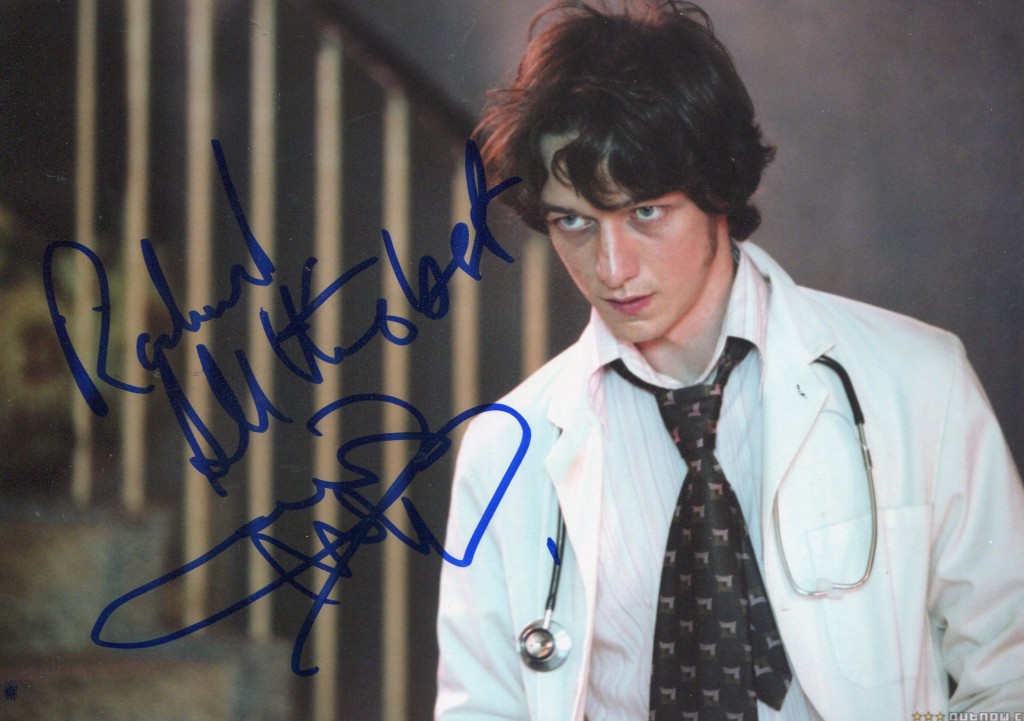
IMDB entry:
McAvoy was raised in Drumchapel, Glasgow, by his grandparents after his father, also called James and a roofer by trade, abandoned his mother when James Jr. was 7. He went to St. Thomas Aquinas Secondary in Jordanhill, Glasgow, where he did well enough and started “a little school band with a couple of mates”.
McAvoy toyed with the idea of the Catholic priesthood as a child but when he was 16, a visit to the school by actor David Hayman sparked an interest in acting. Hayman offered him a part in his film The Near Room (1995) but despite enjoying the experience McAvoy didn’t seriously consider acting as a career, though he did continue to act as a member of PACE Youth Theatre. He applied instead to the Royal Navy and had already been accepted when he was also offered a place at the Royal Scottish Academy of Music and Drama.
He took the place at RSAMD and when he graduated in 2000, he moved to London. He’d already made a couple of TV appearances by this time and continued to get a steady stream of TV and movie work until he came to British public attention in 2004 playing Steve McBride in the successful UK TV series Shameless (2004) and then to the rest of the world in 2005 as Mr Tumnus in Disney’s adaptation of ‘C. S. Lewis”s The Chronicles of Narnia: The Lion, the Witch and the Wardrobe (2005).
Since then he and his easy facility with accents (no, wait, what? he’s Scottish?) have been much in demand.
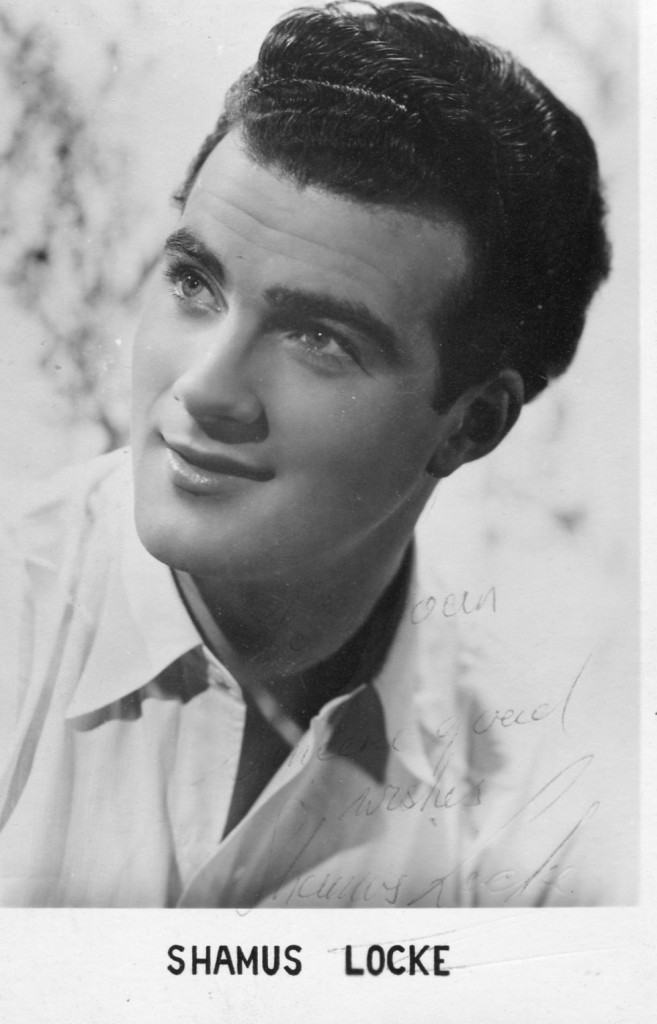
Shamus Locke was born on February 3, 1924 in Navan, Co. Meath, Ireland. He was an actor, known for It’s Alive (1974), Hungry Hill (1947) and The Strangers Came (1949). He died on September 30, 2003 in Rancho Santa Fe, California, USA.



TCM overview:
After a decade on the UK stage, actor Rhys Ifans was propelled into the mainstream with his scene-stealing performance as the unkempt and uninhibited roommate of Hugh Grant in the blockbuster “Notting Hill” (1999). Having provided 90 percent of the romantic comedy’s more hilarious moments, Ifans’ big personality was snapped up for a few more Hollywood supporting roles in the Adam Sandler comedy “Little Nicky” (2000), Lasse Hallstrom’s adaptation of the novel “The Shipping News” (2001), and the thriller “Hannibal Rising” (2007). However, the Welsh actor remained better known overseas, where he was associated with a group of similarly-aged hip London actors including Jude Law and Ewan McGregor; all three being collectively known as the Primrose Hill set. Ifans earned a BAFTA TV Award for his portrayal of English comedian Peter Cook in the biopic “Not Only but Always” (Channel 4, 2004), and was steadily recognized for his assortment of slightly damaged common men and mischievous dreamers in films like “Dancing at Lughnasa” (1998), “Danny Deckchair” (2004) and Richard Curtis’ “Pirate Radio” (2009). With his remarkable ability to become unrecognizable and a versatility that could channel sensitivity or unbridled swagger with equal flair, Ifans laid out a path for a long career as a valuable, quirky screen player.
Born July 27, 1968, Ifans was raised in a Welsh-speaking home in Northern Wales by parents who were primary school teachers. He was drawn to performing at an early age, captivated by the building of the regional Theater Clywd and the touring actors he saw come and go. He became active with youth theater programs and made his stage debut playing a rat in “Toad of Toad Hall,” before going on to dramatic training at Guildhall School of Music and Drama in London. The bilingual actor amassed theater credits in London and Wales including “Hamlet” and “As You Like It,” and in 1990 was cast as the host of a children’s quiz show on Welsh television. During the early 1990s, Ifans also performed with the Welsh rock band Super Furry Animals. In 1994 he made a mark on London’s West End in a production of “Beautiful Thing,” playing the laid back and likable young companion of an older woman whose teenaged son is coming of age. Ifans’ early film appearances included “Streetlife” (1996), a gritty urban drama screened on the film festival circuit, and he was cast by Anthony Hopkins in the fellow Welshman’s directorial debut, “August” (1996), a reworking of Chekhov’s classic “Uncle Vanya” set in 19th Century Wales.
Ifans teamed with his real-life younger brother Llyr Evans (Ifans preferred using the traditional Welsh spelling of their surname) in 1997 and gave a breakout screen performance as one of a pair of sociopathic brothers in “Twin Town.” Presumably setting out to do for Swansea what “Trainspotting” did for Edinburgh (and even executive produced by Danny Boyle and Andrew Macdonald), the less moralizing “Twin Town” proved a mixed success, with many finding the subversive elements of the film troubling, while others enjoyed its boundless energy and irreverence. Ifans’ grimace-laden portrayal of the gleefully violent Jeremy was at once enrapturing and disturbing. The following year, Ifans’ performance in the Irish period drama “Dancing at Lughnasa” (1998) showcased a different side of the actor. In a much more likable and inspiring role, Ifans played an endearing dreamer whose pure-heartedness sparks a sense of independence and abandon in a family of small town sisters.
While Ifans’ previous performances were strong and compelling, they did not capture the public notice of his scene-stealing turn as the flaky, unwashed, oddball Spike in the blockbuster romantic comedy, “Notting Hill” (1999), starring Julia Roberts and Hugh Grant. Ifans earned Best Supporting Actor nominations from the BAFTA and Satellite Awards for playing the uninhibited roommate of a mumbly, self-doubting bookshop owner (Grant) who becomes linked to a world famous actress (Roberts) and endures ’round the clock paparazzi as a result. Ifans reportedly prepared for the role by going unwashed and unshaven for an unpopular amount of time prior to being cast, but in the wake of the film’s runaway success he was eager to clean himself up for a starring turn in the darkly comic crime caper “Rancid Aluminum” (2000). In this adaptation of the novel by Welsh author James Hawes, Ifans co-starred alongside Joseph Fiennes, Tara Fitzgerald and Sadie Frost as a young businessman who mistakenly takes up with the Russian Mafia in a bid to end his financial woes, though with disastrous results.
Ifan’s post-“Notting Hill” buzz led to a steady string of releases in 2000, including another mainstream Hollywood offering “Little Nicky” (2000), in which Ifans supported Adam Sandler as his brother – one of three sons of Satan. He charmed again as a cheeky Welsh pub owner and soccer player in the sports comedy “The Replacements” (2000), starring Keanu Reeves and Gene Hackman, and joined Primrose buddies Jonny Lee Miller, Jude Law and Sadie Frost in the crime drama “Love, Honour, and Obey” (2000), about rival London street gangs. Ifans also supported in the light British comedy “Janice Beard: 45 wpm” (1999), the thriller “You’re Dead” (2000) starring John Hurt, and the teen buddy comedy “Kevin and Perry Go Large” (2000), based on popular British television characters. From this string of mostly light, mainstream films, Ifans was increasingly tapped by independent-minded filmmakers, beginning with his casting in Michel Gondry’s and Charlie Kaufman’s collaboration, “Human Nature” (2001), an absurdly offbeat drama in which Ifans played a man raised in the wild by apes. He followed up with a performance as Beaufield Nutbeem in “The Shipping News” (2001), director Lasse Hallstrom’s disappointing adaptation of Annie Proulx’s Pulitzer Prize-winning novel about a newcomer in a small Newfoundland town.
Following a supporting turn as a dealer in the drug drama “Formula 51” (2001), Ifans gave another standout comedic turn in the warm-hearted “Once Upon a Time in the Midlands” (2002), in which he and fellow Primrose Hill mate Robert Carlyle competed for the affections of a working class single mum. Ifans appeared onstage at the Donmar Theater in “Accidental Death of an Anarchist” and proved he could ably carry a film with his charming performance in the Australian comedy “Danny Deckchair” (2004), as a man who floats away from his unsatisfying life in a lawn chair hoisted by helium balloons, to crash land miles away and make a fresh start with a new identity. Ifans continued his run of strong pictures with “Enduring Love” (2004), starring as a man who witnesses a violent accident and thereafter begins to stalk a fellow passerby (Daniel Craig) who shared the experience. Ifans’ complex turn in the psychological drama earned him a Best Actor nomination from the Empire Awards UK. And while that film was only released in limited theaters, Ifans’ work went wide again when he was cast as love-starved Dobbin in director Mira Nair’s adaptation of Thackeray’s “Vanity Fair,” starring Reese Witherspoon.
Rounding out a year of solid screen achievements, Ifans won a much-deserved BAFTA and earned an International Emmy Award nomination for starring as Peter Cook in “Not Only But Always” (Channel 4, 2004), a biopic about iconic British comedy duo Peter Cook and Dudley Moore. Ifans also achieved critical acclaim as a kind-hearted, vulnerable social worker opposite terminally ill call girl Penelope Cruz in the ensemble drama “Chromophobia” (2005) and returned to the stage where he offered a sly, energetic update of “Don Juan” in a West End staging of the Moliere classic. The actor was back in the international eye the following year for his supporting roles in “The Silence of the Lambs” prequel “Hannibal Rising” (2007) and the sequel “Elizabeth: The Golden Age” (2007); both of which found Ifans playing against his easy charm as antagonistic characters. Much to his dismay, the actor earned the most attention of his career for his year-long relationship with actress Sienna Miller in 2008, though the renowned partier had always been photographed around London with pals the Gallagher brothers of the rock band Oasis and fellow actors from the Primrose Hill set.
The following year, Ifans gave a classic display of his kinetic personality as a voracious-living disc jockey aboard an illegal, seafaring pirate radio station during 1960s England in “Pirate Radio” (2009), from Richard Curtis. Ifans took a villainous turn in the family film sequel “Nanny McPhee and the Big Bang” (2010) before appearing as Xenophilius Lovegood in “Harry Potter and the Deathly Harrows” (2010), the hotly anticipated final installment of the film franchise which ensured another spike in Ifans’ international film profile. He returned to star billing in “Mr. Nice” (2010), based on the biography of an infamous and charismatic British drug trafficker who, while behind bars, taught illiterate inmates to read and write.
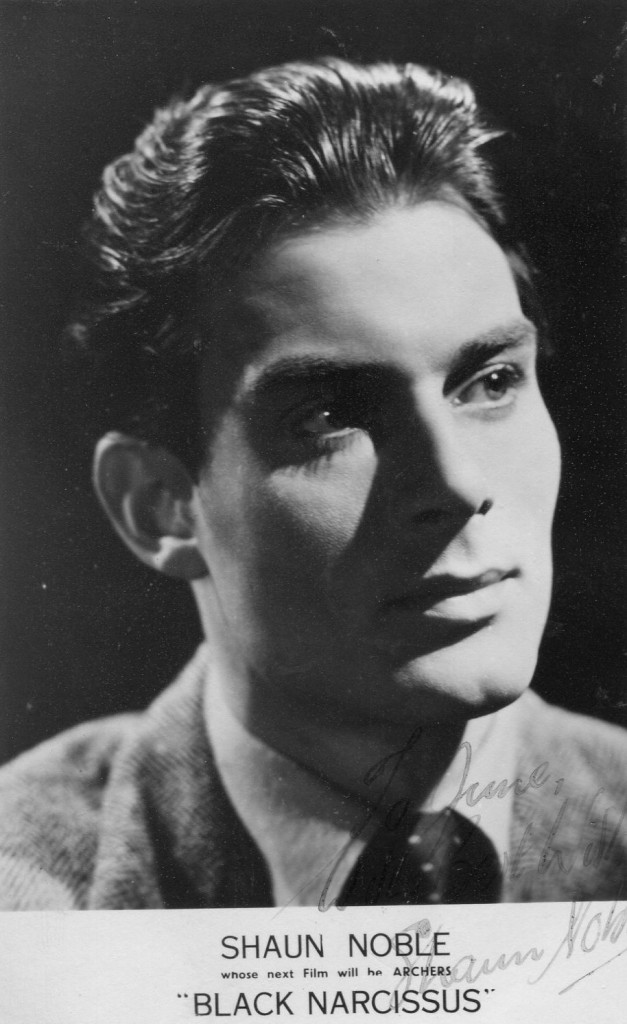
Shaun Noble was born on June 1, 1921 in Dun Laoghaire, Eire. He was an actor, known forBlack Narcissus (1947), A Song for Tomorrow (1948) and The Voice Within (1945). He died in June 1999 in Kensington, London, England.
Anyone who knows me are aware that I am a bit of a movie buff. Over the past few years I have been collecting signed photographs of my favourite actors. Since I like movies so much there are many actors whose work I like.